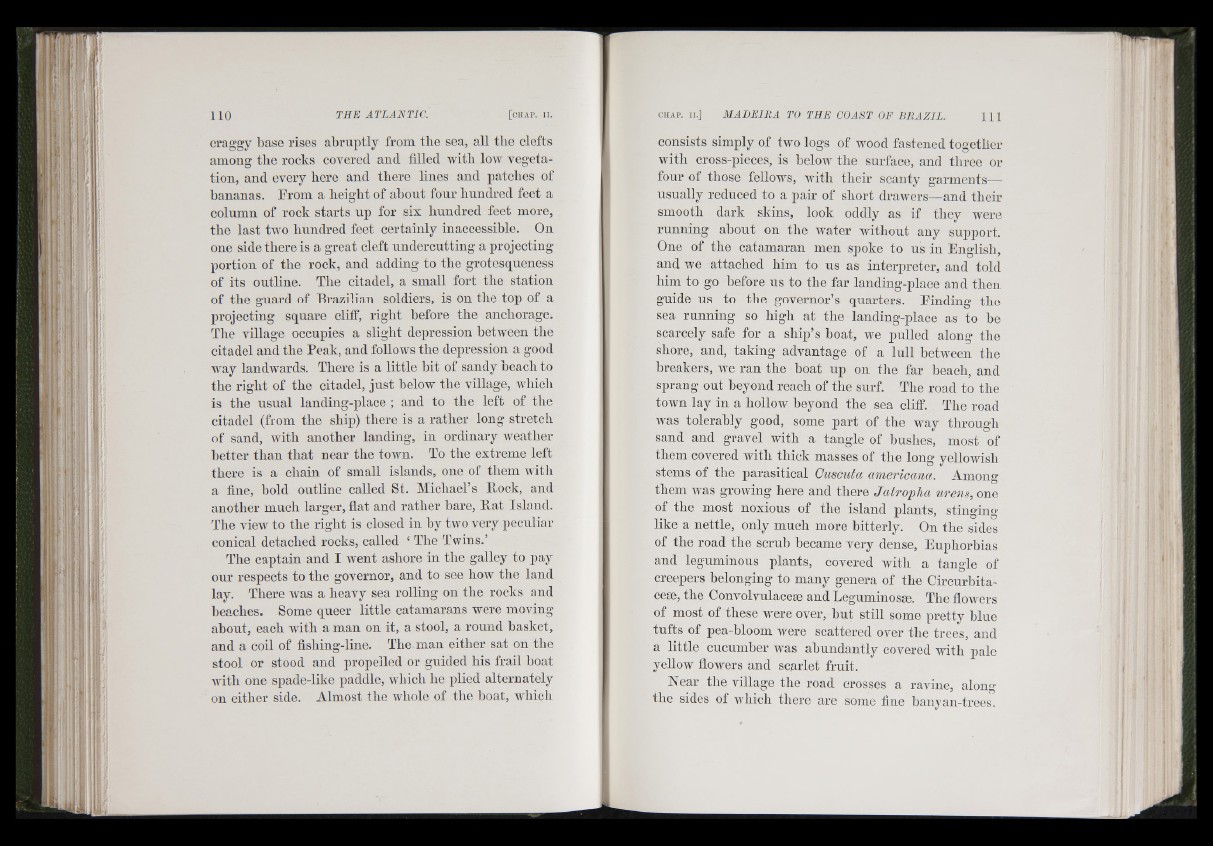
w
T:S :
PI .1 ii.
I ;i-’ , i>I t =■: ,!i - ' ¡I¡.' 'Iii
, -Ii ).»■' '■ I » 1 ‘ i Ii : - , M' i i f Y I " ! ! II : : ! is H: i (• ■’ ■' 'i
i t :
f■j'ili
craggy base rises abruptly from tlie sea, all the clefts
among tlie rocks covered and tilled with Imv vegetation,
and every liere and there lines and patches of
bananas. Erom a height of about four hundred feet a
column of rock starts up for six hundred feet more,
the last tAvo Imndred feet certainly inaccessible. On
one side there is a great cleft undercutting a projecting
portion of the rock, and adding to the grotesqneness
of its outline. The citadel, a small fort the station
of the guard of Brazilian soldiers, is on the top of a
projecting square cliff, right before the anchorage.
The village occupies a slight depression between the
citadel and the Peak, and follows the depression a good
way landAvards. There is a little hit of sandy beach to
the right of the citadel, ju st below the village, which
is the usual landing-place ; and to the left of the
citadel (from the ship) there is a rather long stretch
of sand, Avith another landing, in ordinary weather
better than th a t near the toAA'u. To the extreme left
there is a chain of small islands, one of them AA'ith
a fine, hold outline called St. Michael’s Pock, and
another mnch larger, flat and rather hare, Rat Island.
The vicAV to the right is closed in hy two very peculiar
conical detached rocks, called ‘ The Twins.’
The captain and I went ashore in the galley to pay
onr respects to the governor, and to see hoAv the land
lay. There Avas a heavy sea rolling on the rocks and
beaches. Some queer little catamarans were moving
ahont, each with a m.an on it, a stool, a round basket,
and a coil of fishing-line. The man either sat on the
stool or stood and propelled or guided his frail boat
Avith one spade-like paddle, which he plied alterDately
on either side. Almost the a a I i o I c of the boat, which
consists simply of two logs of Avood fastened together
with cross-pieces, is below the surface, and three or
four of those fellows, with their scanty garments—
usually reduced to a pair of short draAvers—and their
smooth dark skins, look oddly as if they were
running ahont on the water without any support.
One of the catamaran men spoke to ns in English,
and we attached him to ns as interpreter, and told
him to go hefore ns to the far landing-place and then
guide us to the governor’s quarters. Eluding the
sea running so high at the landing-place as to he
scarcely safe for a ship’s boat, we pulled along the
shore, and, taking advantage of a lull betAveen the
breakers, we ran the boat up on the far beach, and
sprang out beyond reach of the surf. The road to the
town lay in a hollow beyond the sea cliff. The road
was tolerably good, some part of the Avay through
sand and gravel with a tangle of bushes, most of
them covered with thick masses of the long yelloAvish
stems of the parasitical Cuscuta americana. Among
them Avas groAving here and there Jatroplia urem, one
of the most noxious of the island plants, stinging
like a nettle, only much more bitterly. On the sides
of the road the scrub became very dense. Euphorbias
and leguminous plants, covered with a tangle of
creepers belonging to many genera of the Circurhita-
cern, the Convolvnlacese and Leguminosa3. The flowers
of most of these were over, h u t still some pretty blue
tufts of pea-hloom Avere scattered over the trees, and
a little encumber was abundantly covered Avith pale
yelioAV flowers and scarlet fruit.
Near the village the road crosses a ravine, along
the sides of Avhich there are some fine banvan-trees.
Mi| •